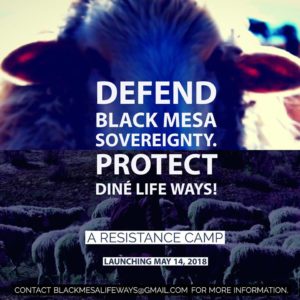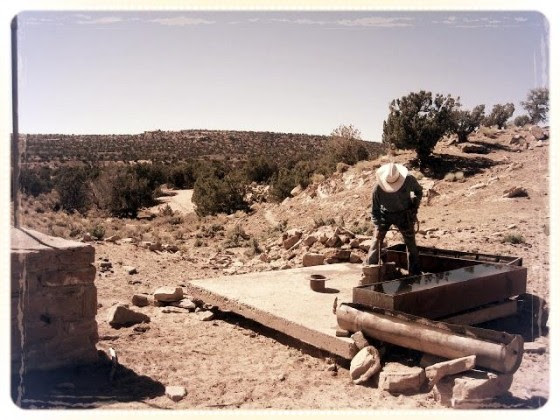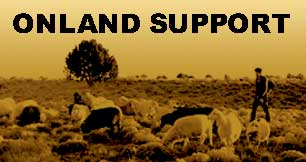Defend Black Mesa Sovereignty. Protect Dine Ways of Life May 14th 2018

On May 14, 2018, the Diné elders of Black Mesa and Big Mountain are calling resisters from near and far to converge at Black Mesa! On that day, they will launch a continuous camp to defend Diné sovereignty and share traditional ways of life with the younger generation.
Participants will help shear sheep and plant crops, supporting the elders of Black Mesa in continuing their traditional practices. They’ll also have the chance to take part in workshops presented by the elders on skills like wool dying with herbs found on the land, weaving, and natural cooking. Together, they’ll help with work projects like building a corral and chopping wood.
Having a continuous presence at the site will also provide a strong measure of protection against livestock impoundments, a threat the elders face on a daily basis. Participants will therefore take part in talks on land defense and serving as human rights witnesses for the Black Mesa community.
Black Mesa is an area of ancestral Diné territory within so-called Arizona where families have been resisting forced relocation for over forty years. The elders here have steadfastly refused to cede their land to Peabody Coal and wish only to continue their traditional life and allow the land to heal.
BACKGROUND:
The sheep, horses and cattle these families maintain on the so-called Hopi Partitioned Lands (HPL) are their primary means of subsistence and an integral part of their traditional lifeway. Impoundments of livestock are a deliberate violation of the rights of Diné people to practice their traditional culture, continuing a shameful legacy of U.S. government-mandated livestock reductions, as seen during the 1860s and the 1930s.
In recent years, hundreds of sheep, cattle and other livestock have been hauled away in impoundment operations by heavily armed police. Elders in the HPL are presently being threatened with impoundments, resulting in great stress, anxiety and hardship. The community is organizing to prevent future impoundments and is asking for additional support at this time.
The Diné communities of Black Mesa are asserting their sovereign rights to continue to protect and maintain their ancestral grazing lands, cornfields, home sites, and sacred places.
Those who are willing to work, learn, and show respect for the Black Mesa community and land are invited to attend. The elders are strongly encouraging indigenous folks to attend, but non-indigenous people are welcome as long as they’re willing to work. No violence, drugs, or weapons will be tolerated.
GET INVOLVED:
We’re also looking for massage therapists who want to come out and do massage for the elders!
If you’d like to participate, please contact us at BlackMesaLifeWays@gmail.com telling us a little bit about yourself and why you’re interested in taking part! If you’re an indigenous person who would like to request travel support for coming out, please let us know that too.
DONATE!
We’re working to raise funds to make sure we have all the necessary building, planting, and shearing materials for the projects that will be happening at the camp. We need to purchase some shears, planting tools, and construction supplies, for example. Funds will also support travel to the camp for indigenous participants who request support, the camp kitchen, and other infrastructure needs. No matter how large or small, every donation will be deeply appreciated and put to good use!
Donate here:
https://www.youcaring.com/blackmesafamilies-1061777
Thank you so much for your support!
Extreme Drought Conditions on Black Mesa: Support Urgently Requested

This spring on Black Mesa, the wind is blowing more dust than moisture, which can be typical this time of year. However as a result from the below average monsoon season in 2017 followed by a winter that netted only a few weak storms, the indigenous resistance communities of Black Mesa are facing extreme drought conditions.
According to official weather projections, the long-term dryness is expected to worsen throughout the summer. Regional supplies of water, hay, and feed on the Navajo Nation are already low and shortages can only be expected to persist.
Although the President of the Navajo Nation has declared a drought emergency and has applied for federal funds to assist Navajo farmers and ranchers, families resisting relocation at Black Mesa within the HPL are unlikely to receive any of this aid.
At this time, Diné families resisting relocation at Black Mesa are issuing an urgent international call for support. Supplemental resources such as water, hay and nutritional support will need to be delivered in order to sustain the herds of sheep and other livestock that families depend on. On the ground assistance from volunteers with sheepherding and sheep shearing experience is also needed, to help maintain the herds of the community.
Diné residents at Black Mesa are currently organizing to support the elders of their community. Local Diné people skilled in sheep shearing will be traveling between households that are requesting shearing assistance. Other volunteers and community members will be collaborating to purchase and distribute essential supplies for livestock including hay and nutritional support for lambs and expectant ewes. There will also be an ongoing need to haul and deliver drinking water to elders living in remote areas. As hotter summer temperatures set in, there will be a continual need for assistance with water and supply delivery. Donations are urgently needed to make these essential efforts possible.
Due in part to the impacts of Peabody Energy’s massive coal operations at Black Mesa, the indigenous communities of the area suffer from perpetual water scarcity and are forced to haul water over great distances for household and livestock needs. Meanwhile, the energy extracted from Black Mesa mining has, for decades, powered key water-delivery infrastructure for Phoenix and other metropolitan areas through the Central Arizona Project. Epidemic drought conditions can only be expected to worsen in coming years, as fossil-fuel induced climate change continues unchecked, driving up global temperatures and accelerating a trend of precipitation loss in the southwest.
What can you do?
- Donate funds to sustain on-land assistance efforts at Black Mesa that seek to ensure the well-being of elders and the ancestral sheep herds. Funds are needed to cover the cost of gas money and supplies.https://supportblackmesa.org/donate/ Specify: BMIS-Dineh Drought Relief Fund
- Come to the land and stay with a family at Black Mesa. Come prepared to herd sheep and work under the direction of Diné matriarchs. https://supportblackmesa.org/take_action/
- Find ways to lend your support to Diné people and organizations that are working to shut down the Kayenta Mine and Navajo Generating Station forever. Support Diné and other indigenous organizing against fracking and other extractive energy projects.


